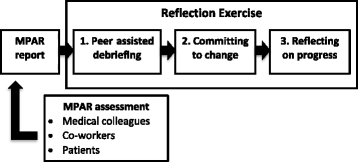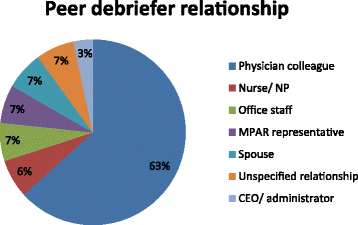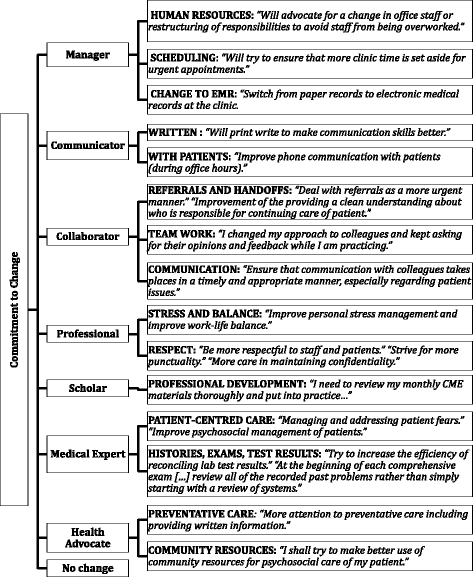Peer-assisted debriefing of multisource feedback: an exploratory qualitative study
- PMID: 29540204
- PMCID: PMC5853071
- DOI: 10.1186/s12909-018-1137-y
Peer-assisted debriefing of multisource feedback: an exploratory qualitative study
Abstract
Background: The Manitoba Physician Achievement Review (MPAR) is a 360-degree feedback assessment that physicians undergo every 7 years to retain licensure. Deliberate reflection on feedback has been demonstrated to encourage practice change. The MPAR Reflection Exercise (RE), a peer-assisted debriefing tool, was developed whereby the physician selects a peer with whom to review and reflect on feedback, committing to change. This qualitative study explores how physicians who had undergone the MPAR used the RE, what areas of change are identified and committed to, and what they perceived as the role of reflection in the MPAR process.
Methods: The MPAR RE was piloted out to a cohort of MPAR-reviewed physicians. Thematic analysis was conducted on completed exercises (n = 61). Semi-structured interviews were conducted with individuals (n = 6) who completed the MPAR RE until saturation was reached.
Results: Physicians reviewed feedback with a range of peers, including colleagues, staff, and spouses. Many physicians were surprised by feedback, both positive and negative, but interviewees found the RE useful in processing feedback. Areas where physicians committed to change were diverse, covering all CanMEDS roles. Most physicians identified themselves as being successful in implementing change, though time, habit, and structures were cited as barriers.
Conclusions: Peer-assisted debriefing can assist reflection of multisource feedback. It is easy to implement, is not resource-intensive, and feedback implies that it is effective at promoting change. Participants, with the aid of peers, identified areas for change, developed approaches for change, and largely thought themselves successful at implementing changes. Areas of change included all seven CanMEDS roles.
Keywords: CanMEDS; Commitment to change; Multisource feedback; Peer-assisted debriefing; Reflection.
Conflict of interest statement
Ethics approval and consent to participate
This study was approved by the Health Research Ethics Board at the University of Manitoba (H2013:419). Consent was not sought for secondary analysis of completed RE forms; interview participants provided written informed consent.
Consent for publication
Not applicable.
Competing interests
The authors declare that they have no competing interests.
Publisher’s Note
Springer Nature remains neutral with regard to jurisdictional claims in published maps and institutional affiliations.
Figures
Similar articles
-
Responses of rural family physicians and their colleague and coworker raters to a multi-source feedback process: a pilot study.Acad Med. 2003 Oct;78(10 Suppl):S42-4. doi: 10.1097/00001888-200310001-00014. Acad Med. 2003. PMID: 14557092
-
Sharing Reflections on Multisource Feedback in a Peer Group Setting: Stimulating Physicians' Professional Performance and Development.Acad Med. 2021 Oct 1;96(10):1449-1456. doi: 10.1097/ACM.0000000000004142. Acad Med. 2021. PMID: 33951680
-
Evaluation of physicians' professional performance: an iterative development and validation study of multisource feedback instruments.BMC Health Serv Res. 2012 Mar 26;12:80. doi: 10.1186/1472-6963-12-80. BMC Health Serv Res. 2012. PMID: 22448816 Free PMC article.
-
"Directed" self-assessment: practice and feedback within a social context.J Contin Educ Health Prof. 2008 Winter;28(1):47-54. doi: 10.1002/chp.155. J Contin Educ Health Prof. 2008. PMID: 18366127 Review.
-
Multisource feedback in the assessment of physician competencies.J Contin Educ Health Prof. 2003 Winter;23(1):4-12. doi: 10.1002/chp.1340230103. J Contin Educ Health Prof. 2003. PMID: 12739254 Review.
Cited by
-
Audit and group feedback in nursing home physician groups: lessons learned from a qualitative study.BMC Health Serv Res. 2025 Feb 11;25(1):227. doi: 10.1186/s12913-025-12355-y. BMC Health Serv Res. 2025. PMID: 39934853 Free PMC article.
-
Multisource feedback: an overview of its use and application as a formative assessment.Can Med Educ J. 2022 Aug 26;13(4):30-35. doi: 10.36834/cmej.73775. eCollection 2022 Aug. Can Med Educ J. 2022. PMID: 36091727 Free PMC article.
-
Designing a system for performance appraisal: balancing physicians' accountability and professional development.BMC Health Serv Res. 2021 Aug 12;21(1):800. doi: 10.1186/s12913-021-06818-1. BMC Health Serv Res. 2021. PMID: 34384410 Free PMC article.
References
-
- The College of Physicians and Surgeons of Manitoba. About MPAR. Manitoba Physician Achievement Review. http://mpar.ca/welcome/about-mpar. Accessed 15 Feb, 2015.
MeSH terms
LinkOut - more resources
Full Text Sources
Other Literature Sources




